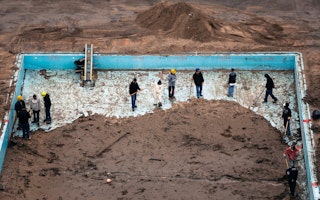The Failed U.S. Transparency Law That’s Killing Angola’s Economy
By Elias Isaac
U.S. oil and gas companies pay billions of dollars to the Angolan government every year in exchange for my country’s oil. But for now, we do not know exactly how much U.S. oil and gas companies are paying my government because they have blocked a key regulation requiring them to tell us.
Five years ago, President Obama signed the Dodd-Frank Wall Street Reform bill into law. The law included a provision, Section 1504, requiring U.S. oil, gas, and mining companies to disclose the amounts they paid for contracts to extract energy and minerals in developing countries.
The law was intended to reveal how much money U.S. oil companies were paying to the Angolan government. In turn, we could then hold our government accountable for how it spent the billions it receives from U.S. oil and mining companies. The law is designed to stop elites in Angola—and countries like it—from looting public treasuries.
The problem is that the American Petroleum Institute has fought Section 1504 and stopped its implementation.
While the regulatory and legal debates continue in Washington, corruption and poor governance go on. In 2012, for example, the IMF found that $4.2 billion linked to Angola’s state-owned oil company was missing from the public accounts—a sum that far surpasses Angola’s annual public health budget. So while government elites luxuriate in oil wealth, many of Angola’s children are starving to death.
The Securities and Exchange Commission (SEC) is charged with implementing Section 1504, but its first attempt to do so in 2012 was stopped by a legal challenge filed by the American Petroleum Institute. The SEC is now reissuing an implementing rule.
Stalling Section 1504 has proved to be disastrous for the Angolan economy. Sonangol, Angola’s oil and gas company, has been said by its CEO to be on the brink of technical bankruptcy. Despite receiving significant revenues in the last 10 years, Angola is borrowing huge sums of money from China, the United States, Brazil, Italy, and Spain. It is estimated that Angola’s foreign debt sits at 43 percent of its GDP, which is a serious risk to an already fragile economy.
The U.S. oil lobby has continued its campaign to eviscerate Section 1504. The companies want the SEC to implement a weak and watered-down rule because they fear that U.S. firms will lose business to competitors that are not covered by similar transparency requirements and disclosure laws.
Even though they have had five years to show that Section 1504 harms their business interests, the oil companies have not provided any credible evidence to support their argument. Companies win the right to drill for oil based on specific factors, such as price, technological capability, and access to capital. A company’s transparency record is irrelevant to its business operations.
Moreover, the European Union, Canada, and Norway have introduced similar laws since 2010. Today, more than two-thirds of the world’s top 200 publicly listed oil and mining companies are now covered by revenue transparency rules. These include U.S. firms’ biggest Chinese and Russian competitors such as Gazprom and PetroChina.
Some oil companies support strong revenue disclosure laws because they recognize that they foster efficient markets, reduce corruption risks, and enhance companies’ reputation. For example, the Norwegian oil company Statoil has said that disclosing revenues has given it a competitive advantage.
Besides Statoil, the U.S. oil firm Kosmos has endorsed the EU’s law requiring companies to report revenues for each extraction project they own. And the UK-based Tullow Oil also has chosen to comply with the EU’s disclosure law well ahead of the legal deadline to do so. Finally, major international investors support Section 1504 and other disclosure laws because they understand that more transparency and better governance is good for business. That’s why a group of investors, including UBS Asset Management, Railpen Investments, and Allianz Global Investors, worth more than $6.4 trillion, have written to the SEC in support of a strong U.S. rule.
When Section 1504 was signed into law, the United States became a leader in the revenue transparency movement. But five years later, America has been eclipsed by other governments that have adopted stronger disclosure requirements. By implementing a rule in line with the EU’s and Canada’s, the United States can level the playing field for business and lead the fight against corruption.
Elias Isaac is Angola country director for the Open Society Initiative for Southern Africa.


